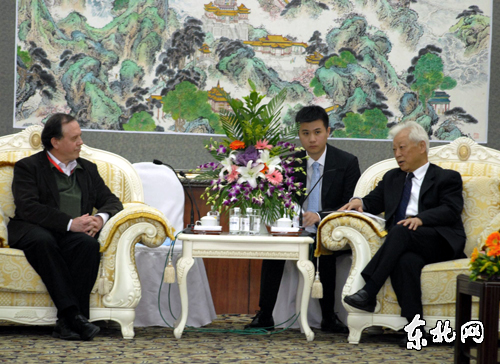On November 5, The CPPCC News published an interview with Zhou Tienong, vice-chairman of the National People’s Congress Standing Committee and chairman of the Revolutionary Committee of the Chinese Kuomintang, translated by CDT:
When asked how he usually introduces China’s system of political parties to foreigners, Zhou said:
I am used to introducing China’s system of political parties from two dimensions – our basic national conditions and our efforts to develop the country. China is a developing country and in the process of development there needs to be someone to take the leading role. A political force has to live up to two requirements if it wants to take that leading role: First, it has to be stable; Second, it cannot be conservative and should be very willing to be supervised by all parties. The Chinese Communist Party is such a force. On one hand, its ruling status was formed from history. No one is trying to topple it from power. So it is stable. On the other hand, we can supervise it so that it won’t become conservative on the precondition that no one tries to topple it.
I think supervision that does not aim to topple (the ruling party) is most effective. The participating parties’ supervision of the ruling party is for the sake of the better execution of its work. It helps consolidate the status of the ruling party, which is apparently happy to accept such supervision. On the other hand, if the supervision aims to throw (the ruling party) out of power, there will be a lack of trust. One side is forced to be vigilant about the other side’s every sentence and to study its real intentions – does it want to supplant us (as the ruling party)? In this case, the supervision will achieve little.
So China’s system of political parties is not only favorable to the stability of political forces but also to the ruling party’s willingness to accept supervision. I told them (foreigners) that the current system of political parties had guaranteed political stability and economic prosperity for China for 30 years uninterrupted. This is a certainty. To adopt a new system of political parties will be an uncertainty. Of course there are some problems in this certainty, but it is good and acceptable in general. Since the status quo is acceptable and we feel not so bad, why should we find a new uncertain alternative to replace it? Many foreign friends agreed with my point of view.”

Image: Gou Tienong meeting with foreign guest.
民革中央主席周铁农谈
参政党如何监督执政党
A02版:新闻 稿件来源:报刊文摘
《人民政协报》11月5日刊登记者对全国人大常委会副委员长、民革中央主席周铁农的专访文章。
在回答 “平常怎样向外国人介绍中国的政党制度”时,周铁农说,我习惯于从中国的基本国情和中国的发展实践两个层面介绍中国的政党制度。中国是发展中国家,发展中需要有人来带个头。要成为带头的政治力量得符合两个标准:第一要稳定,第二要不保守,善于接受各方监督。中国共产党就是这样一支力量,一方面,中国共产党的执政地位是历史形成的,没有人要拉其下台,所以稳定;另一方面,有人在不拉其下台的前提下对其进行监督,使其不保守。
我以为不以拉下台为目的的监督是最有效的监督。参政党对执政党的监督是为了执政党把工作做好,有利于执政党地位更稳固,执政党显然乐于接受。相反,如果以拉下台为目的,这种监督之间就缺少信任,一方不得不对另一方说的每句话都要警惕,仔细思考,其居心究竟何在,是不是为了取而代之,这样监督的效果就会大打折扣。
所以中国的政党制度既有利于政治力量的稳定,又有利于接受监督。我告诉他们,从实践上看,现行的政党制度已经保证中国实现了连续30年保持政治稳定,经济繁荣,这是已知数;换个政党制度是未知数。当然,这个已知数里肯定有些问题,但是这个已知数总体上是好的,是可以接受的。既然已知数是可以接受的,而且感觉还不错,为什么要找未知数来代替呢?很多外宾还是认同了我的观点的。






